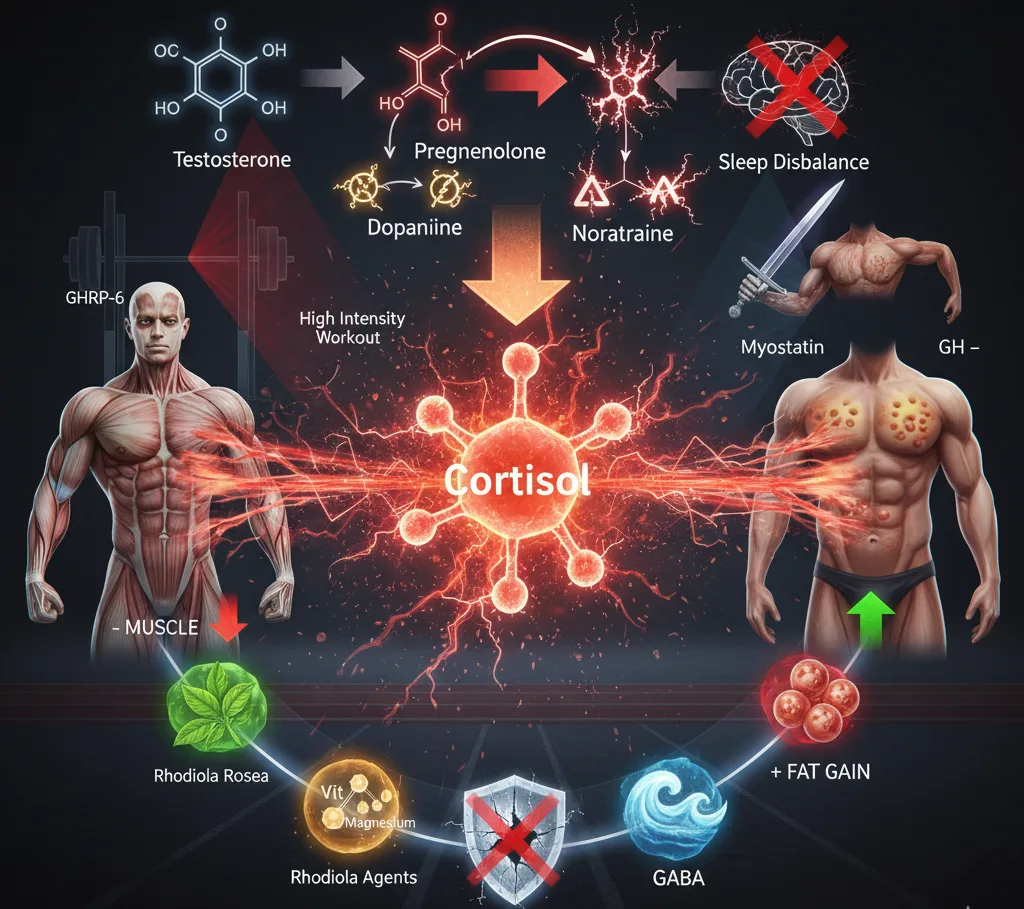Cortisol, often dubbed the "stress hormone," is a glucocorticoid produced by the adrenal glands. While essential for various bodily functions, chronically elevated levels can wreak havoc on your physique, mental state, and overall health. For anyone pursuing fitness, understanding how cortisol operates and how to manage it is crucial for optimal results.
The Detrimental Effects of High Cortisol
When cortisol levels are consistently high, it can lead to a cascade of negative effects:
Muscle Destruction and Fat Gain: Cortisol is catabolic, meaning it breaks down tissues. It can lead to muscle protein breakdown, hindering muscle growth and recovery. Simultaneously, it promotes fat storage, particularly in the abdominal area.
Hormonal Imbalances: Elevated cortisol can impact other vital hormones. It can shift the pathway of pregnenolone (a precursor to many hormones, including testosterone) towards cortisol production, potentially leading to lower testosterone levels. It also plays a role in the conversion of dopamine to adrenaline and noradrenaline, which can contribute to a heightened state of alert.
Thyroid Function: High cortisol can interfere with the conversion of T4 to T3, the active form of thyroid hormone. It can also block T3 release, impacting metabolism and energy levels.
Increased Myostatin and Decreased Growth Hormone (GH): Cortisol has been shown to increase myostatin, a protein that inhibits muscle growth, and simultaneously decrease Growth Hormone (GH) production, further compromising muscle development and recovery.
Neurological Impact: Elevated cortisol is associated with increased levels of glutamic acid, which can contribute to excitotoxicity in the brain. It also increases adrenaline, which can lead to sleep disturbances and an overall feeling of being "wired but tired."
Weakened Immune System: Chronic stress and high cortisol levels can suppress the immune system, making you more susceptible to illness.
Factors That Increase Cortisol
Several lifestyle and dietary factors can contribute to elevated cortisol:
Dietary Choices: Lower carbohydrate diets can sometimes increase cortisol, especially if energy intake is insufficient for activity levels.
Specific Supplements/Compounds: Certain supplements, like GHRP-6, have been noted to increase cortisol levels.
Overtraining/High Intensity: While exercise is beneficial, excessively intense or prolonged workouts without adequate recovery can spike cortisol.
Stress: Mental and emotional stress are primary drivers of cortisol release.
Strategies to Manage and Lower Cortisol
Effectively managing cortisol involves a multi-faceted approach, combining dietary strategies, exercise adjustments, and targeted supplementation:
Workout Intensity and Frequency:
Consider lower workout intensity on certain days to prevent overtraining.
Some suggest that two shorter training sessions rather than one long, grueling session might help manage cortisol peaks.
Carbohydrate Timing: Consuming amylopectin or other fast-digesting carbohydrates during or immediately after training can help blunt cortisol response and aid in glycogen replenishment.
Strategic Supplementation:
Rhodiola Rosea: An adaptogen that can help the body adapt to stress, often taken at the beginning of the day.
Glycine: A simple amino acid that can help calm the central nervous system (CNS). It can be beneficial before workouts to reduce stress or before sleep to promote relaxation.
Vitamin D and Magnesium: These essential nutrients play roles in numerous bodily functions, including hormone regulation and stress response. Magnesium, in particular, is known for its calming properties.
GABA (gamma-Aminobutyric acid): A major inhibitory neurotransmitter that helps regulate brain function, promoting relaxation and reducing anxiety.
Adaptogens: Beyond Rhodiola, other adaptogens like Ashwagandha and Asian Ginseng are widely used to help the body resist stressors of all kinds, supporting adrenal health and balancing cortisol.
Conclusion: Achieving Hormonal Harmony
Cortisol is a vital hormone, but like anything, balance is key. By understanding the factors that elevate it and implementing strategies to manage its levels, you can create an optimal internal environment for muscle growth, fat loss, improved sleep, and a stronger immune system. Prioritizing recovery, smart nutrition, and stress management will be your strongest allies in maintaining hormonal harmony and achieving your fitness goals.

